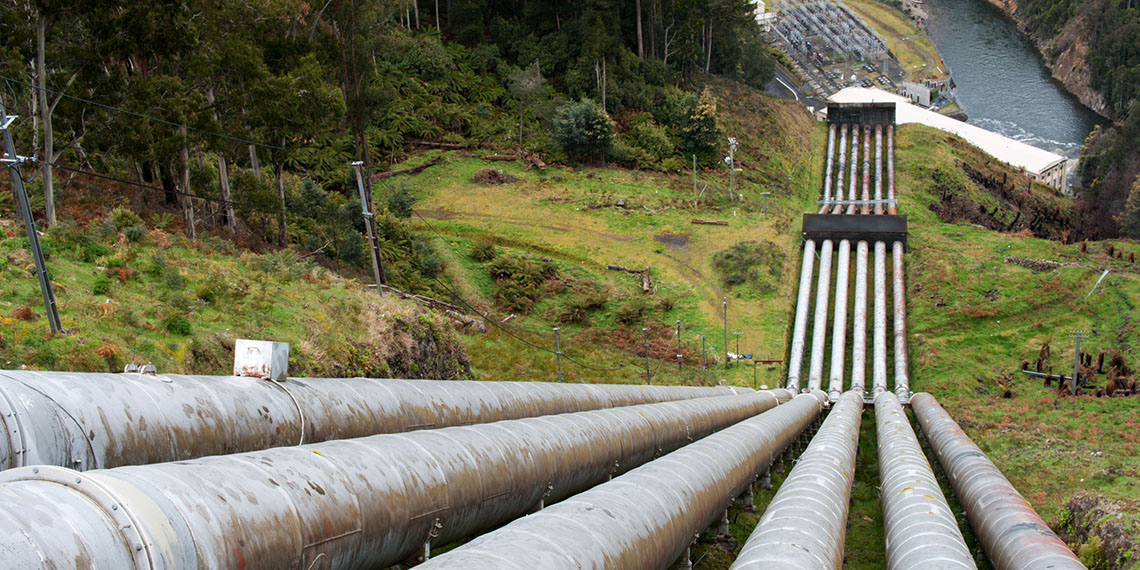Focus on the fundamentals: new Taswater CEO on his plans

Six weeks into the role, new Taswater CEO George Theo has laid out his priorities for the utility.
Bringing more than 30 years’ experience to the role, including his most recent position as CEO at Queensland’s Unitywater, Theo said he was drawn to TasWater due to its commitment to making a significant and positive contribution to the lives of Tasmanians.
“TasWater is a nine-year-old organisation that has inherited a 100-year legacy. This was a big undertaking and the utility has made some incredible improvements in its short history,” he said.
“I see my role here as continuing on with TasWater’s corporate strategy and roadmap, while applying my strengths to execute this vision efficiently and to deliver outcomes that make a difference for our customers, the community and environment.
“One of my central aims will be to bring our people together with a common focus on the purposeful work that we do at TasWater, and deliver that work in a way that continues to remain affordable for the communities we serve.”
Future challenges
Theo said that while all water sector organisations are facing increasing pressures to do more with less, TasWater has had a unique challenge in regards to needing to invest heavily in compliance works.
“TasWater has done an excellent job in the last nine years to actually remove boiled water notices, which was an issue the utility inherited when it formed,” he said.
“Our capital investment program, which is about $1.7 billion, is roughly 70% compliance related. I don’t think a lot of other jurisdictions have such a large proportion of their capital program being compliance based.
“There's been a lot of work done in terms of increasing the reliability of water services in Tasmania, and there's still more work to do.”
Theo said this includes ensuring the treatment and management of effluent is always compliant and reducing dry-weather spills.
“There's still work to do in this space, but it's work that has been identified, funds have been made available and we're just working through what needs to be done. We're addressing some long-term inherited environmental issues and we are working through these challenges we have such as reducing the frequency of wet weather overflows.”
Theo said another challenge he looks forward to working through is TasWater’s approach to the post-COVID work environment.
“Finding the right balance between working in the office and working remotely is a challenge a lot of organisations are facing at the moment. We need to get the model right, so that we can retain our people and attract new talent by having working arrangements that are flexible,” he said.
“One of the things COVID showed us is that, while technology allows us to work remotely, we need to be mindful of nurturing our connection to organisation, which is super important for a company to be successful in the long run.
“But where there's good will, good things happen, and getting people to stay connected is important to working towards our goals together.”
Purposeful prioritisation
While there are challenges ahead for TasWater, Theo said it’s important to stay focused and continue to effectively prioritise actions towards achieving what’s most important.
“I’ve found that many organisations try to be everything to everybody. In trying to do too much, they end up achieving less than they are capable of because they spread themselves too thin,” he said.
“My aim is to help TasWater ensure the most important things come first, including what’s important for our customers, our owners, regulators, and the people within the organisation. By ruthlessly prioritising, we will be able to move the dial quicker on what we need to achieve.”
And the things that matter most are TasWater’s customers, the environment, its people and ensuring TasWater contributes to the prosperity of Tasmania, Theo said.
“We want to be predictable, we want to be reliable, we want our customers to see us as a valuable contributor to the Tasmanian economy,” he said.
“Our capital program over the next four years is being delivered predominantly by Tasmanian companies creating hundreds of jobs in the process.
“We are focused on improving the environment through our operations and we want customers to have reliable services that are affordable for the long term. We don't want our customers to wonder whether they're going to get reliable service or not. We don't want customers having price shock from bills as a result of how we run the business.
“While everything that we do is important, we have to get really good at differentiating between those things that are going to have the biggest impact.
Pathway to innovation
Given that TasWater manages water services right across the entire state, which features a highly dispersed population and many remote locations, Theo said one key opportunity he is seeking to harness is digitalisation.
“The geography of Tasmania poses some real opportunity around the digitalisation of our physical infrastructure,” he said.
“If we can get ahead with our digital aspirations, aligning our people and the technology we want to use, the beneficiaries of a smart digital program will be our customers, the environment and our owners.
“We need to be able to predict when and where assets might misbehave so that we can intervene before problems arise for customers or the environment, and I think this is achievable via smart investment in digital.”
Theo said TasWater’s digitalisation needs to focus first on the things that are going to improve the way the organisation manages its infrastructure and the way it interacts with customers.
“Our customers should have a hassle-free experience when they're dealing with us. It's got to be easy for them. But we also need to be able to manage our assets so that customers don't experience an interruption to water supply, or an overflow of sewerage, or poor water quality,” he said.
In order to achieve these outcomes via investments in digital technologies, Theo said it’ll be important to foster a truly innovative mindset, by looking for new ways of doing work better.
“We need to sit back and think about how we can be more aspirational, we should be bold in the outcomes we're trying to achieve, and be very clear about what our goals are,” he said.
“While some customers may be happy to pay more for certain outcomes like protecting the environment, I think we should be working really hard to make sure that any impact on customers from a financial perspective is minimal.
“We must look for ways to improve reliability of services and environmental outcomes without adding a further burden on customers to pay more. So that's our challenge!
“For me, trying to figure out ways to be more efficient, while growing staff engagement and alignment with our aspirational goals is really exciting.
“It forces the organisation to work with its partners in innovative ways to deliver better overall outcomes. Doing more with less is where innovation starts to really kick in.
“Furthermore, customers expect it of us, and I think it's the right expectation for them to have.”


